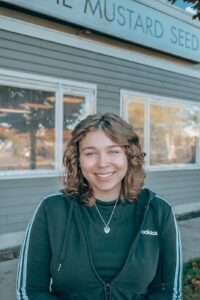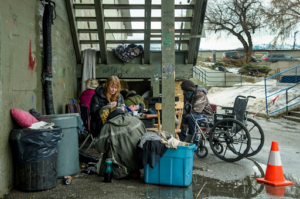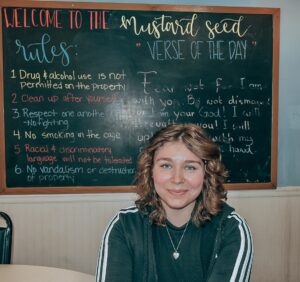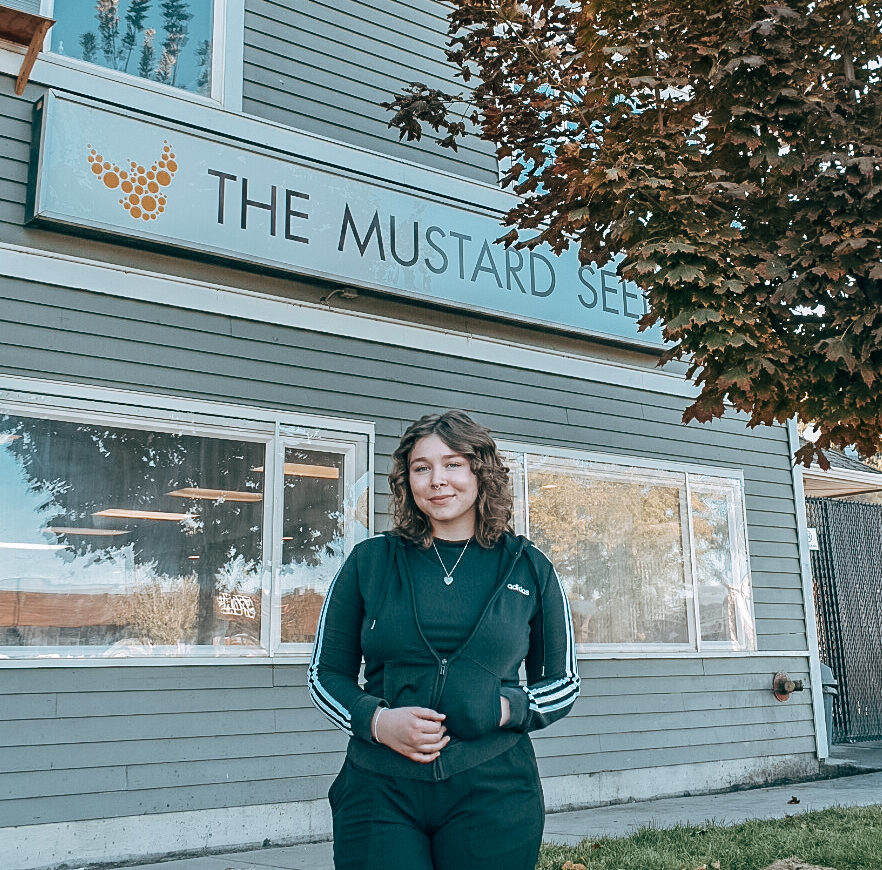
Photo of: Meadow Ryder Image by: Holly Grover
After looking into the addiction and housing crisis within Kamloops, we wanted to learn more about the issues and decided to talk to Meadow, a shelter support worker at the Mustard Seed shelter and thrift store. The Mustard Seed is a non-profit organization that is funded by its thrift store. They have many donors, including Starbucks, who donate food items to help feed the community.
Meadow is currently enrolled at Thompson Rivers University. She is taking the police and justice program and is using the experience she gets from working as a shelter support worker to help achieve her goals for the future. When asked what she was hoping to accomplish at the Mustard Seed, she replied, “I genuinely just want to help and make a difference in my client’s lives. I love seeing them smile and laugh and being there for them when they are down so I can do what I can to lift them back up.”
Many of them are such amazing, smart, kind and positive people; despite going through so much – they are just beautiful people.
“I do think Kamloops is limited. I know most, if not all, rehab centers for addiction require clients to be clean before they enter the program. This can be especially challenging for people experiencing addiction that are also homeless. One common reason for this is a large number of the people experiencing homelessness often do not have a lot of friends and family to support them. Somebody experiencing addiction needs a lot of support; it would be extremely challenging to overcome it alone. If people suffering with addiction don’t have that support and can’t get clean alone, they will not be accepted into a rehab center. For me, this is a really upsetting aspect because these people need help to get clean but can’t access the help unless they are already sober. It kind of defeats the purpose of the rehabilitation center for people who need support and don’t have it – it’s a very vicious cycle.” This was Meadow’s response when we asked her how she felt about the addiction services offered in Kamloops. She believes that the resources offered in Kamloops are only easily accessible if you know where to look. “I think if I were able to improve the accessibility of the resources, I would have them do seminars at high schools and universities to make the resources known. I would have various resources broadcasted on the radio and allow it to be an open conversation, so it’s easier in the sense that if someone needs help, they can ask questions in a comfortable manner that allows them to feel judgment-free.” Meadow also said that one of the biggest resources Kamloops is lacking is the ability to access health care, as well as the transportation to health care facilities.

Photo courtesy of Dave Eagles/KTW
“How do you handle and protect yourself from the lack of control, and inevitable grief that comes with making connections with suffering individuals?” When we asked Meadow this question she responded with, “It can be hard, I will admit. Especially if you have been through the same trauma as someone who is opening up with you. If it’s something that I’ve experienced, I hurt for them, because I know what it’s like. I think the best thing to do is to make sure you are fully ready to take on the weight of the conversation. An important aspect is knowing that it’s okay to say that you aren’t able to have that conversation right now. If it’s urgent, direct them to someone who can help them, or ask them and say ‘Hey, I’m having a really hard day today and although I really care about what you are trying to tell me, I don’t have the capacity for this right now. Would it be okay if we talked about this tomorrow?’ You can’t pour from an empty cup and it’s okay to just say no, of course you want to help people but you also need to look out for yourself so you can continue to do so.”

Photo of : Meadow Ryder Image by: Holly Grover
The final question we asked Meadow was, “What’s the one thing you would tell the world if you could, that they could do within their daily lives to help the situation of those struggling with mental health and addiction?” She replied, “Treat them as human beings. So many people believe they are better than these individuals, maybe because they have more materialistic things or are not struggling with the same things. But many of these people have been through things I could’ve never imagined, and then fell on hard times because they didn’t have anybody to help them. Many of them are such amazing, smart, kind and positive people; despite going through so much-they are just beautiful people.”
